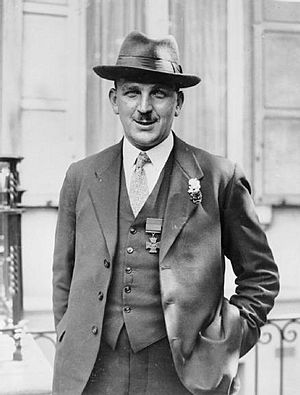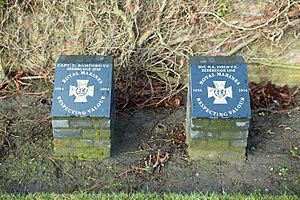Norman Finch facts for kids
Quick facts for kids
Norman Augustus Finch
|
|
|---|---|
 |
|
| Born | 26 December 1890 Birmingham, England |
| Died | 15 March 1966 (aged 75) Portsmouth, England |
| Buried |
Portchester Crematorium
|
| Allegiance | United Kingdom |
| Service/ |
Royal Marines |
| Years of service | 1908–1929 1938–1945 |
| Rank | Lieutenant |
| Unit | Royal Marine Artillery |
| Battles/wars | First World War Second World War |
| Awards | Victoria Cross Royal Victorian Medal Meritorious Service Medal Mentioned in Despatches |
| Other work | Yeoman of the Guard |
Norman Augustus Finch was a brave soldier in the Royal Marines. He received the Victoria Cross (VC), which is the highest award for bravery. This special medal is given to British and Commonwealth forces for amazing acts of courage. Norman Finch was born on December 26, 1890, and passed away on March 15, 1966.
Early Life and Military Start
Norman Finch was born in Birmingham, England. He joined the Royal Marines in January 1908. He received his basic training at Eastney. For the next four years, he served on various ships and at shore stations. He was promoted to bombardier in June 1913. He then became a corporal in 1915 and a sergeant in 1917. He joined the 4th Battalion on March 23, 1918.
His Victoria Cross Story

Norman Finch was 27 years old during the First World War. He was a sergeant in the Royal Marine Artillery. He earned the Victoria Cross (VC) for an amazing act of bravery.
This brave deed happened on April 22/23, 1918, in Zeebrugge, Belgium. Sergeant Finch was second in command of the guns on HMS Vindictive. The ship was being hit by enemy fire almost constantly. Sergeant Finch and his officer kept firing back without stopping.
Then, two heavy shells directly hit their position. Everyone else was killed or badly hurt, except for Sergeant Finch. He was severely wounded, but he stayed in his damaged and open spot. He continued to fight the enemy on the Mole (a long pier). His position was hit again, putting all the remaining guns out of action. He received his award through a special ballot.
Later Career and Life
Finch retired from service as a quartermaster sergeant in December 1929. However, he returned to the Portsmouth Division in 1938. During the Second World War, he mainly worked as a quartermaster. He served as a storekeeper officer (lieutenant) at a training group in Devon. On August 15, 1945, he was released from service. In 1964, he became the divisional sergeant major of the Yeoman of the Guard. He passed away on March 15, 1966.
You can see his Victoria Cross medal at the Royal Marines Museum in Southsea.
 | James Van Der Zee |
 | Alma Thomas |
 | Ellis Wilson |
 | Margaret Taylor-Burroughs |

